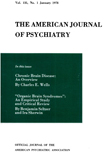Calcium: pacesetting the periodic psychoses
Abstract
In this double-blind study dihydrotachysterol (DHT) was given orally to eight psychotic patients; in each case marked increases in psychosis and agitation accompanied increases in serum calcium and phosphorus within two weeks after active drug was substituted for placebo. In the three patients whose psychoses exhibited periodic spontaneous exacerbations, the agitated episodes grew more severe. Serum creatine phosphokinase (CPK) increased in all but one patient. By contrast, when three periodically psychotic patients received synthetic salmon calcitonin (SCT), the severity and frequency of agitated episodes decreased while CSF calcium increased in all three. These data support the hypothesis that the observed abrupt increases in serum calcium and phosphorus might cause the opposite CSF calcium shifts, the behavioral agitation and the increases in serum CPK frequently noted during acute psychosis.
Access content
To read the fulltext, please use one of the options below to sign in or purchase access.- Personal login
- Institutional Login
- Sign in via OpenAthens
- Register for access
-
Please login/register if you wish to pair your device and check access availability.
Not a subscriber?
PsychiatryOnline subscription options offer access to the DSM-5 library, books, journals, CME, and patient resources. This all-in-one virtual library provides psychiatrists and mental health professionals with key resources for diagnosis, treatment, research, and professional development.
Need more help? PsychiatryOnline Customer Service may be reached by emailing [email protected] or by calling 800-368-5777 (in the U.S.) or 703-907-7322 (outside the U.S.).



